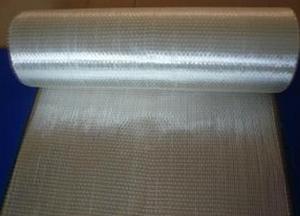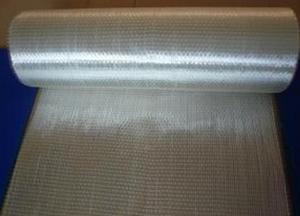E-glass Fiberglass Woven Roving 600gsm-1000mm
- Loading Port:
- Shanghai
- Payment Terms:
- TT or LC
- Min Order Qty:
- 5000 m²
- Supply Capability:
- 300000 m²/month
OKorder Service Pledge
OKorder Financial Service
You Might Also Like
Structure of woven roving Description
1,high strenth,corosion and resistence
2,consistent thickness,no fuzz
3,rapid impregnating
Glass woven rovings are bidirectional fabric by direct rovings in plain weave pattern. They are applicable for hand lay-up, winding and compress molding process, suitable for manufacturing tank, boat, automobile parts and other FRP products.
Main Features of the woven roving
1)Drapes well to suit the surface of intricate moulds
2)Fast wet-through and wet out
3)Easy handing and better appearance of the composite parts
4)Compatible with Unsaturated polyester resin
5)Very high laminate strength properties
Woven roving Images
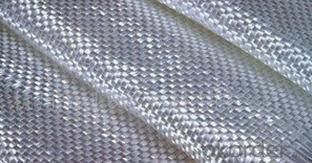
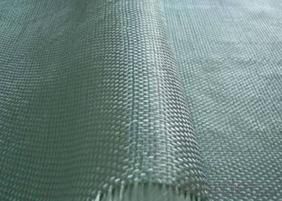
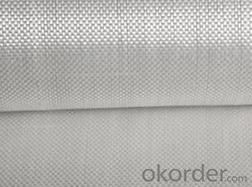
Woven roving Specification:
Normal type | EWR800 | EWR400 | EWR300 | EWR500 | EWR600 |
Thickness (mm) | 0.8 | 0.4 | 0.3 | 0.5 | 0.6 |
Density(warpxweft) (end/cm) | 1.8x1.5+/-10% | 3.6x3.2+/-10% | 4.6x4.1+/-10% | 2.2X2.0+/-10% | 2.6X2.4+/-10% |
Tex (warpxweft) | 2400x2400 | 600X600 | 300x400 | 1200x1200 | 1200X1200 |
Moisture content(%) | <0.2% | <0.2% | <0.2% | <0.2% | <0.2% |
Loss on ignition(%) | 0.4 – 0.8 | 0.4-0.8 | 0.4-0.8 | 0.4-08 | 0.4-0.8 |
Width(cm) | 125+/-1 | 125+/-1 | 125+/-1 | 125+/-1 | 125+/-1 |
Weight (g/m2) | 816+/-41 | 408+/-32 | 300+/-15 | 500+/-25 | 600+/-30 |
Weight per roll(kg) | 45 | 46 | 50 | 45 | 45 |
Glass | E-glass | E-glass | E-glass | E-glass | E-glass |
FAQ of woven roving:
Delivery Detail: 15-21days
Other spec. can be custom made as per customer's request.
Packaging:
Each roll is wound onto a 3” paper core and packed in plastic bag plus standard pallet packing.
Storage:
Glass Fiebr products should preferably be stored at room temperature and a relative humidity between 50% and 70%
- Q:Is fiberglass mat tissue suitable for underground applications?
- Fiberglass mat tissue is indeed suitable for underground applications. This material is commonly used in various industries, including construction, infrastructure, and plumbing, due to its exceptional strength, durability, and resistance to environmental factors. Underground environments often pose challenges such as moisture, high humidity, and corrosive substances, which can compromise the integrity of traditional materials. However, fiberglass mat tissue is specifically designed to withstand these conditions, making it an ideal choice for underground applications. Additionally, its non-combustible nature and resistance to chemicals make it a reliable option for areas where fire safety is a concern. Overall, fiberglass mat tissue is a versatile and reliable material that can effectively withstand the challenges of underground environments.
- Q:What is the impact resistance of fiberglass mat tissue at high temperatures?
- The impact resistance of fiberglass mat tissue can vary at high temperatures, depending on factors like its specific composition, the manufacturing process, and the testing conditions. In general, fiberglass mat tissue has good impact resistance at high temperatures due to the inherent strength and durability of fiberglass materials. Fiberglass is recognized for its excellent mechanical properties, including high tensile strength and stiffness, which contribute to its overall impact resistance. Typically, fiberglass mat tissue maintains its structural integrity and can withstand impact without cracking or breaking at high temperatures. This is because the fiberglass fibers are designed to endure high temperatures and do not easily soften or deform. However, it's worth noting that the impact resistance of fiberglass mat tissue can be affected by other factors like the presence of additives or binders used during manufacturing. Some additives or binders may decrease impact resistance or make the tissue more prone to damage at high temperatures. To determine the specific impact resistance of a particular fiberglass mat tissue at high temperatures, it's crucial to refer to the manufacturer's specifications or conduct specific tests under controlled conditions. These tests can provide more precise information on how the material will perform under impact at elevated temperatures.
- Q:Does fiberglass mat tissue require any special precautions during storage?
- Special precautions are necessary when storing fiberglass mat tissue. Fiberglass is a delicate material that can easily be damaged if not stored correctly. Here are some precautions to keep in mind: 1. Maintain dry conditions: It is important to store fiberglass mat tissue in a dry, moisture-free environment. Excessive moisture can compromise its strength and integrity. 2. Avoid direct exposure to sunlight: The UV rays from sunlight can gradually degrade fiberglass. To prevent damage, store the material in a cool, shaded area away from direct sunlight. 3. Shield from dust and dirt: To maintain its effectiveness, fiberglass mat tissue should be stored in a clean, dust-free environment. Dust and dirt particles can become embedded in the material and reduce its efficiency. 4. Steer clear of extreme temperatures: Extreme heat or cold can also have an impact on the quality of fiberglass mat tissue. It is advisable to store it in an environment with controlled temperatures to prevent any potential damage. 5. Proper packaging: If the fiberglass mat tissue comes with packaging, it is recommended to keep it in its original packaging for added protection. If not, consider using a durable, moisture-resistant wrapping material. By adhering to these precautions, you can ensure that your fiberglass mat tissue remains in optimal condition during storage and is ready for use whenever necessary.
- Q:Can fiberglass mat tissue be used for wall insulation?
- Yes, fiberglass mat tissue can be used for wall insulation. Fiberglass mat tissue is a lightweight and flexible material that is commonly used for thermal and acoustic insulation in buildings. It is made from fine fibers of glass that are woven together to form a mat. This mat is then used as a layer of insulation, either in the form of rolls or batts, that is placed between the wall structure and the finished wall surface. Fiberglass mat tissue is an effective insulation material because it has a high resistance to heat transfer. It helps to prevent heat loss in the winter and heat gain in the summer, reducing energy consumption and maintaining a comfortable indoor temperature. It also acts as a sound barrier, reducing noise transmission between rooms and from outside sources. Furthermore, fiberglass mat tissue is non-combustible, which means it does not contribute to the spread of fire. This makes it a safe choice for wall insulation, as it helps to slow down the progression of a fire and provides valuable time for occupants to evacuate. In addition to its insulation properties, fiberglass mat tissue is also easy to install. It can be cut to size and fitted into wall cavities, ensuring a snug and efficient insulation layer. It is also durable and long-lasting, providing insulation benefits for many years. Overall, fiberglass mat tissue is a suitable choice for wall insulation due to its thermal and acoustic properties, fire resistance, ease of installation, and durability.
- Q:Can fiberglass mat tissue be used for insulation in underground pipelines?
- Yes, fiberglass mat tissue can be used for insulation in underground pipelines. It is a common material choice for insulating pipes due to its excellent thermal properties, durability, and resistance to moisture. The fiberglass mat tissue helps to reduce heat loss and prevent condensation, ensuring efficient and reliable insulation for underground pipelines.
- Q:Can fiberglass mat tissue be used for composite pipe manufacturing?
- Yes, fiberglass mat tissue can be used for composite pipe manufacturing. Fiberglass mat tissue provides reinforcement to the composite pipe, enhancing its strength, durability, and resistance to corrosion.
- Q:Can fiberglass mat tissue be used for insulation in chemical storage tanks?
- Yes, fiberglass mat tissue can be used for insulation in chemical storage tanks. Fiberglass is known for its excellent insulation properties, making it a suitable material for insulating tanks that store chemicals. The fiberglass mat tissue is typically made from fine glass fibers that are woven together to create a strong and durable material. This mat tissue can be applied to the inner walls of the tank to provide insulation and prevent heat transfer. Additionally, fiberglass is corrosion-resistant and can withstand the harsh chemicals often stored in these tanks, making it an ideal choice for insulation in chemical storage tanks.
- Q:Can fiberglass mat tissue be used for corrosion-resistant applications?
- Yes, fiberglass mat tissue can be used for corrosion-resistant applications. Fiberglass mat tissue is made from fine glass fibers bonded with a resinous binder, which provides excellent corrosion resistance properties. The tissue is designed to be used as a barrier layer in various corrosion-resistant applications such as in the construction of tanks, pipes, and vessels that are exposed to corrosive environments. The fiberglass mat tissue acts as a protective barrier, preventing the penetration of corrosive elements and enhancing the durability and longevity of the structure. Additionally, the tissue is lightweight, easy to handle, and can be easily molded into complex shapes, making it an ideal choice for corrosion-resistant applications.
- Q:Can fiberglass mat tissue be used for insulating crawl spaces?
- Yes, fiberglass mat tissue can be used for insulating crawl spaces. It is a commonly used material for thermal insulation due to its good insulation properties and moisture resistance. It can help to reduce heat loss and prevent moisture buildup in crawl spaces, making it an effective choice for insulating this area.
- Q:Can fiberglass mat tissue be used for electrical transformers?
- Electrical transformers can utilize fiberglass mat tissue, a material with superb electrical insulation properties, as an insulation material. In the manufacturing of transformers, this material is commonly employed due to its exceptional electrical insulation characteristics. Constructed from delicate glass fibers that are firmly bonded together with a resin, fiberglass mat tissue forms a robust and long-lasting substance. Remarkably, it possesses the ability to endure high temperatures and possesses a strong dielectric strength, rendering it ideal for utilization in electrical transformers. Moreover, its lightweight and flexible nature facilitates effortless handling and installation into transformer components. Furthermore, it displays resistance against moisture, chemicals, and fire, thereby further enhancing its suitability for use in transformer applications. In conclusion, fiberglass mat tissue represents a dependable and efficient choice for insulation purposes in electrical transformers.
1. Manufacturer Overview |
|
|---|---|
| Location | |
| Year Established | |
| Annual Output Value | |
| Main Markets | |
| Company Certifications | |
2. Manufacturer Certificates |
|
|---|---|
| a) Certification Name | |
| Range | |
| Reference | |
| Validity Period | |
3. Manufacturer Capability |
|
|---|---|
| a)Trade Capacity | |
| Nearest Port | |
| Export Percentage | |
| No.of Employees in Trade Department | |
| Language Spoken: | |
| b)Factory Information | |
| Factory Size: | |
| No. of Production Lines | |
| Contract Manufacturing | |
| Product Price Range | |
Send your message to us
E-glass Fiberglass Woven Roving 600gsm-1000mm
- Loading Port:
- Shanghai
- Payment Terms:
- TT or LC
- Min Order Qty:
- 5000 m²
- Supply Capability:
- 300000 m²/month
OKorder Service Pledge
OKorder Financial Service
Similar products
New products
Hot products
Related keywords
